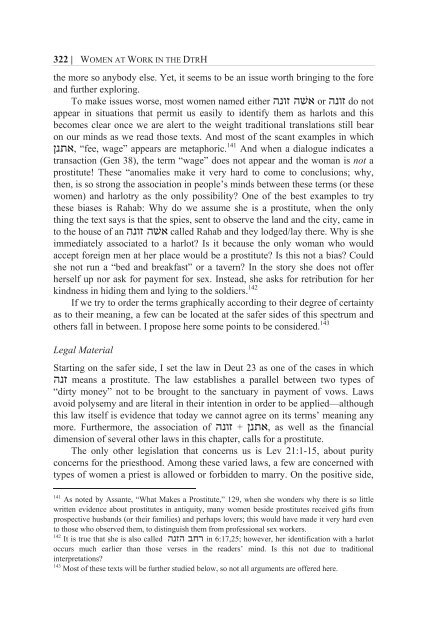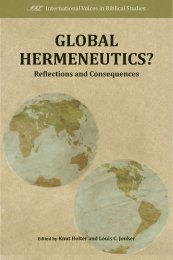Women at Work in the Deuteronomistic History - International Voices ...
Women at Work in the Deuteronomistic History - International Voices ...
Women at Work in the Deuteronomistic History - International Voices ...
You also want an ePaper? Increase the reach of your titles
YUMPU automatically turns print PDFs into web optimized ePapers that Google loves.
322 | WOMEN AT WORK IN THE DTRH<br />
<strong>the</strong> more so anybody else. Yet, it seems to be an issue worth br<strong>in</strong>g<strong>in</strong>g to <strong>the</strong> fore<br />
and fur<strong>the</strong>r explor<strong>in</strong>g.<br />
To make issues worse, most women named ei<strong>the</strong>r הנוז השׁא or הנוז do not<br />
appear <strong>in</strong> situ<strong>at</strong>ions th<strong>at</strong> permit us easily to identify <strong>the</strong>m as harlots and this<br />
becomes clear once we are alert to <strong>the</strong> weight traditional transl<strong>at</strong>ions still bear<br />
on our m<strong>in</strong>ds as we read those texts. And most of <strong>the</strong> scant examples <strong>in</strong> which<br />
ןנתא, “fee, wage” appears are metaphoric. 141 And when a dialogue <strong>in</strong>dic<strong>at</strong>es a<br />
transaction (Gen 38), <strong>the</strong> term “wage” does not appear and <strong>the</strong> woman is not a<br />
prostitute! These “anomalies make it very hard to come to conclusions; why,<br />
<strong>the</strong>n, is so strong <strong>the</strong> associ<strong>at</strong>ion <strong>in</strong> people’s m<strong>in</strong>ds between <strong>the</strong>se terms (or <strong>the</strong>se<br />
women) and harlotry as <strong>the</strong> only possibility? One of <strong>the</strong> best examples to try<br />
<strong>the</strong>se biases is Rahab: Why do we assume she is a prostitute, when <strong>the</strong> only<br />
th<strong>in</strong>g <strong>the</strong> text says is th<strong>at</strong> <strong>the</strong> spies, sent to observe <strong>the</strong> land and <strong>the</strong> city, came <strong>in</strong><br />
to <strong>the</strong> house of an הנוז השׁא called Rahab and <strong>the</strong>y lodged/lay <strong>the</strong>re. Why is she<br />
immedi<strong>at</strong>ely associ<strong>at</strong>ed to a harlot? Is it because <strong>the</strong> only woman who would<br />
accept foreign men <strong>at</strong> her place would be a prostitute? Is this not a bias? Could<br />
she not run a “bed and breakfast” or a tavern? In <strong>the</strong> story she does not offer<br />
herself up nor ask for payment for sex. Instead, she asks for retribution for her<br />
k<strong>in</strong>dness <strong>in</strong> hid<strong>in</strong>g <strong>the</strong>m and ly<strong>in</strong>g to <strong>the</strong> soldiers. 142<br />
If we try to order <strong>the</strong> terms graphically accord<strong>in</strong>g to <strong>the</strong>ir degree of certa<strong>in</strong>ty<br />
as to <strong>the</strong>ir mean<strong>in</strong>g, a few can be loc<strong>at</strong>ed <strong>at</strong> <strong>the</strong> safer sides of this spectrum and<br />
o<strong>the</strong>rs fall <strong>in</strong> between. I propose here some po<strong>in</strong>ts to be considered. 143<br />
Legal M<strong>at</strong>erial<br />
Start<strong>in</strong>g on <strong>the</strong> safer side, I set <strong>the</strong> law <strong>in</strong> Deut 23 as one of <strong>the</strong> cases <strong>in</strong> which<br />
הנז means a prostitute. The law establishes a parallel between two types of<br />
“dirty money” not to be brought to <strong>the</strong> sanctuary <strong>in</strong> payment of vows. Laws<br />
avoid polysemy and are literal <strong>in</strong> <strong>the</strong>ir <strong>in</strong>tention <strong>in</strong> order to be applied—although<br />
this law itself is evidence th<strong>at</strong> today we cannot agree on its terms’ mean<strong>in</strong>g any<br />
more. Fur<strong>the</strong>rmore, <strong>the</strong> associ<strong>at</strong>ion of הנוז + ןנתא, as well as <strong>the</strong> f<strong>in</strong>ancial<br />
dimension of several o<strong>the</strong>r laws <strong>in</strong> this chapter, calls for a prostitute.<br />
The only o<strong>the</strong>r legisl<strong>at</strong>ion th<strong>at</strong> concerns us is Lev 21:1-15, about purity<br />
concerns for <strong>the</strong> priesthood. Among <strong>the</strong>se varied laws, a few are concerned with<br />
types of women a priest is allowed or forbidden to marry. On <strong>the</strong> positive side,<br />
141 As noted by Assante, “Wh<strong>at</strong> Makes a Prostitute,” 129, when she wonders why <strong>the</strong>re is so little<br />
written evidence about prostitutes <strong>in</strong> antiquity, many women beside prostitutes received gifts from<br />
prospective husbands (or <strong>the</strong>ir families) and perhaps lovers; this would have made it very hard even<br />
to those who observed <strong>the</strong>m, to dist<strong>in</strong>guish <strong>the</strong>m from professional sex workers.<br />
142 It is true th<strong>at</strong> she is also called הנזה בחר <strong>in</strong> 6:17,25; however, her identific<strong>at</strong>ion with a harlot<br />
occurs much earlier than those verses <strong>in</strong> <strong>the</strong> readers’ m<strong>in</strong>d. Is this not due to traditional<br />
<strong>in</strong>terpret<strong>at</strong>ions?<br />
143 Most of <strong>the</strong>se texts will be fur<strong>the</strong>r studied below, so not all arguments are offered here.




